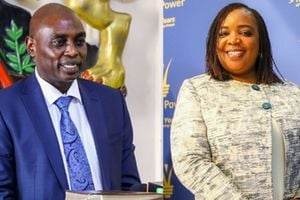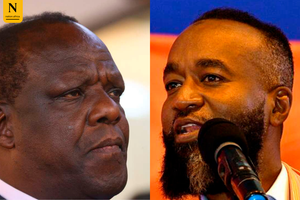
ODM party leader Raila Odinga addresses journalists flanked by former Mombasa governor Ali Hassan Joho (left), former Kakamega governor Wycliffe Oparanya (right) and other party members at the Convent Hotel in Nairobi on April 11, 2024.
Raila Odinga's Orange Democratic Movement (ODM) is considering consensus as one of the methods to conduct its grassroots elections, which are due to begin this month.
The use of consensus, which involves an agreement by party members or delegates on who will occupy which office, is always used to deal with the potential fallout associated with contested elections.
Mr Odinga yesterday chaired a meeting of the party's National Executive Committee (NEC), which ratified changes to its electoral body in preparation for the phased exercise that begins on April 27.
"The NEC has given the go-ahead for the phased conduct of the grassroots elections from April 27, 2024," said ODM Deputy Secretary-General Agnes Zani, who read the resolutions.
"We urge our party members to participate in this exercise and elect officials who will lead the party to prosperity. It is worth noting that ODM is the only party in the country that has consistently complied with its legal obligations as stipulated in the Political Parties Act, including conducting grassroots elections on time," Dr Zani added.
ODM Chairman John Mbadi said party members will consider the most appropriate method of elections in their regions as long as it is provided for in the party's constitution.
The ODM constitution provides for the use of consensus, secret ballot and queuing behind candidates (mlolongo).
“Methods to be used cannot be uniform in all areas. Members will agree on which method they want to use so long as it is provided for by the party,” said Mr Mbadi.
“Members can agree to use consensus, secret ballot, by raising their hands or queuing. Consensus is used where people agree on who they want to occupy which position. But if they cannot agree, then secret ballot is deployed to settle the competition,” explained Mr Mbadi.
The meeting which was also attended by ODM deputy party leaders –Wycliffe Oparanya and Hassan Joho – also approved the decision to disband the National Elections Board (NEB).
It consequently endorsed the establishment of the three-member National Elections Coordinating Committee to oversee the party elections.
“We endorsed the new-look three-member National Elections Coordinating Committee (NECC) to replace the defunct National Elections Board (NEB) that was disbanded following recommendations of the National Executive Committee (NEC) on September 6, 2023,” said Dr Zani.
The newly created NECC will have devolved roles, which will be executed at the county level by a three-member County Elections Committee (CECs).
Also Read: Raila Odinga’s departure spells doom for ODM
This is subject to resolution by the National Governing Council (NGC) scheduled for next week.
The party retained Emily Awita and Richard Tairo – who served in the now defunct NEB – in the new Coordinating Committee.
Ms Awita has since been proposed to chair the new team. The party also proposed Beatrice Askul to be the third member of the committee.
Kwale, Busia and Siaya counties will hold the elections on April 27, according to the schedule. Kajiado, Migori and Wajir will have theirs on April 29, with the first phase set to conclude on April 30 with similar exercise in Kisii, Vihiga and Murang'a counties.
Party elections have in the past turned divisive and chaotic resulting in major fallouts, a scenario that has made many outfits in the country to avoid holding party elections, especially through universal suffrage.
An attempt by Mr Odinga in 2014 to hold party elections at Kasarani national stadium aborted after a group of youth dressed in black famously known as men in black stormed the venue and bungled the exercise.
It later, however, emerged that the youths were hired by some senior party officials to avert what was claimed as an attempt by some external forces to take over the party by planting their proxies in key party positions.
In Jubilee, former President Uhuru Kenyatta declined to call for party elections even as his then deputy, William Ruto, sustained pressure for party members to participate in electing officials.
The outfit that was formed in the run up to the 2017 General Elections installed interim officials with plans to have elections within three years.
But Mr Kenyatta refused to call the elections after it emerged that Dr Ruto was plotting a takeover of the party in preparation for his 2022 presidential bid.
Mr Kenyatta would later, after kicking out President Ruto’s sympathizers, hold the party National Delegates Conference (NDC) where his allies were installed in key party positions. Jeremiah Kioni was picked to replace Raphael Tuju as the party Secretary-General.










